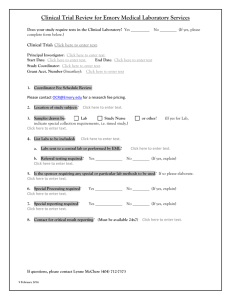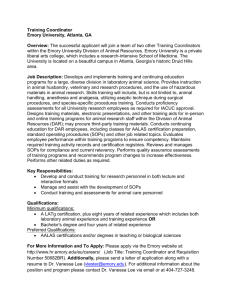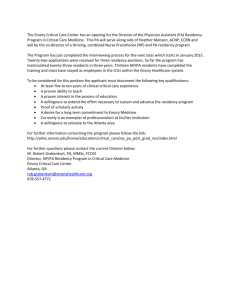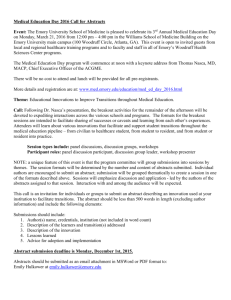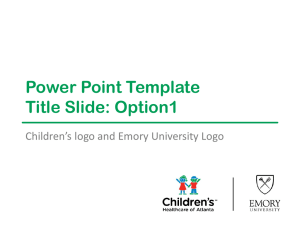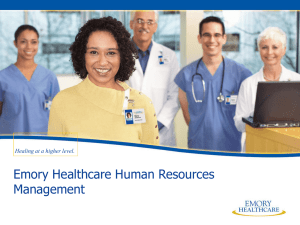School of Medicine Industry Relationships Highlights
advertisement
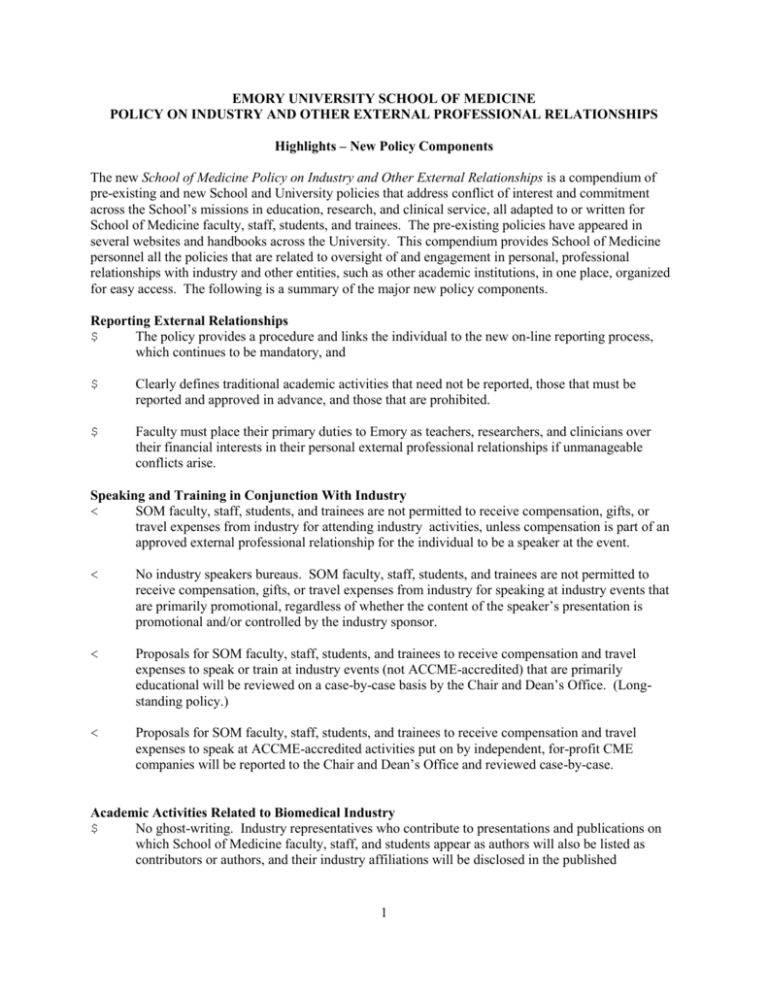
EMORY UNIVERSITY SCHOOL OF MEDICINE POLICY ON INDUSTRY AND OTHER EXTERNAL PROFESSIONAL RELATIONSHIPS Highlights – New Policy Components The new School of Medicine Policy on Industry and Other External Relationships is a compendium of pre-existing and new School and University policies that address conflict of interest and commitment across the School’s missions in education, research, and clinical service, all adapted to or written for School of Medicine faculty, staff, students, and trainees. The pre-existing policies have appeared in several websites and handbooks across the University. This compendium provides School of Medicine personnel all the policies that are related to oversight of and engagement in personal, professional relationships with industry and other entities, such as other academic institutions, in one place, organized for easy access. The following is a summary of the major new policy components. Reporting External Relationships $ The policy provides a procedure and links the individual to the new on-line reporting process, which continues to be mandatory, and $ Clearly defines traditional academic activities that need not be reported, those that must be reported and approved in advance, and those that are prohibited. $ Faculty must place their primary duties to Emory as teachers, researchers, and clinicians over their financial interests in their personal external professional relationships if unmanageable conflicts arise. Speaking and Training in Conjunction With Industry < SOM faculty, staff, students, and trainees are not permitted to receive compensation, gifts, or travel expenses from industry for attending industry activities, unless compensation is part of an approved external professional relationship for the individual to be a speaker at the event. < No industry speakers bureaus. SOM faculty, staff, students, and trainees are not permitted to receive compensation, gifts, or travel expenses from industry for speaking at industry events that are primarily promotional, regardless of whether the content of the speaker’s presentation is promotional and/or controlled by the industry sponsor. < Proposals for SOM faculty, staff, students, and trainees to receive compensation and travel expenses to speak or train at industry events (not ACCME-accredited) that are primarily educational will be reviewed on a case-by-case basis by the Chair and Dean’s Office. (Longstanding policy.) < Proposals for SOM faculty, staff, students, and trainees to receive compensation and travel expenses to speak at ACCME-accredited activities put on by independent, for-profit CME companies will be reported to the Chair and Dean’s Office and reviewed case-by-case. Academic Activities Related to Biomedical Industry $ No ghost-writing. Industry representatives who contribute to presentations and publications on which School of Medicine faculty, staff, and students appear as authors will also be listed as contributors or authors, and their industry affiliations will be disclosed in the published 1 document. $ No food and drink for School of Medicine events, such as grand rounds and conferences, will be provided by industry either to Departments or to individual faculty, staff, trainees, and students, for Emory activities on or off campus or in our clinical affiliates. $ Faculty who present formal lectures to medical students and trainees will disclose their external financial relationships with biomedical industry. $ All CME activities that occur in Emory buildings will be managed by the School of Medicine CME Office. $ The School of Medicine continuing medical education (ACCME-accredited) policies are currently under revision with the Council of Chairs, as are the national guidelines. The new policies will be presented soon. $ Emory faculty physicians might be permitted to train other physicians in conjunction with a company in Emory facilities (usually Emory or Midtown Hospitals) on a fee-for-service basis where the funds go to Emory and conflicts of interest are very carefully managed. These proposals will be considered on a case-by-case basis. The policy provides a detailed mechanism. $ Faculty who propose to train others on behalf of a company outside of Emory should convert the training to an ACCME-accredited CME activity through the SOM CME Office. If not possible, proposals will be considered on a case-by-case basis. Industry Gifts to Individuals $ No gifts from industry will be accepted by individual School of Medicine faculty, staff, students, and trainees, at Emory or away from Emory, regardless of amount, value, or nature. $ No medications and pharmaceutical samples from industry will be accepted by individual School of Medicine faculty, staff, students, and trainees. All samples will be donated and managed centrally by the hospital pharmacies. (Expansion of EHC policy to all faculty, all sites.) $ No compensation for travel expenses directly from industry will be accepted by School of Medicine faculty, staff, students, and trainees, except as part of approved external arrangements. Industry Gifts to School of Medicine and Departments $ Industry funds to the School of Medicine and Departments must be given centrally through the SOM, WHSC, or University Development Offices. $ Funds from industry must be placed in designated pooled accounts in the Dean’s Office or in the central Department Office, as appropriate, depending on the nature and purpose of the gift and with the intent of avoiding even the appearance of a conflict of interest. $ Industry funds will be directed to the broad specialties and large sub-specialties of medicine or to broad topical areas in research and education and will not be directed to individuals or small groups in a manner that identifies the specific company to the recipient. $ Gifts of equipment and devices will be made centrally to the School of Medicine through the 2 Development Office and can in some cases be designated for a specific purpose. $ Industry donors will have no expectation of any benefit in return for the gift; no quid pro quo. Industry Access to Buildings $ Access by industry representatives to School of Medicine and Emory Healthcare buildings and other areas where School faculty, staff, students, and trainees work and study may occur only on invitation by a faculty member or administrative staff member and is usually restricted to nonpatient care areas and non-public areas. However, sales and marketing representatives will not be invited to educational and training events held in School of Medicine and EHC buildings or other Emory or affiliate buildings where SOM personnel, students, and trainees work and study. $ Industry representatives on campus must register and wear badges. $ Inclusion of students and trainees in interactions with industry representatives will occur only for Emory’s educational and training purposes and under the supervision of the faculty member. Start-up Companies (Under current School of Medicine policy, all faculty start-up companies must be approved by the Department Chair and Dean’s Office, and perhaps by EHC, before they can work with the Office of Technology Transfer on licensing Emory intellectual property. The following practices are stated in the new policy.) $ For start-up companies that involve technology generated at Emory or the faculty member’s area of professional work at Emory, faculty who have a financial interest in the company cannot hold a fiduciary role. An exception can be considered for the initial start-up period. $ Faculty investigators with ownership interests in a start-up company cannot allow students and trainees to work in the company or on company research outside of Emory, or on research sponsored by the company at Emory. Administrative Roles Related to External Biomedical Industry Relationships $ Because of their leadership roles and their fiduciary duty, officers of the School of Medicine (Deans, Department Chairs, Department Division Directors, and Directors of School of Medicine administrative units) are held to an even higher standard of ethics, integrity, professionalism, and objectivity in their decisions and conduct and might not be permitted to engage in some external industry relationships that would be allowed for others. Under Consideration $ The Department Chairs have approved a mandatory website for disclosure of faculty external financial relationships with industry. Details and coordination with EHC are under discussion. $ Additional policies on continuing medical education and the relationship with industry are being developed. 3
